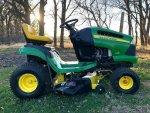That should be in the owners manual which is a free read ( you can print out small sections only ) off their web site.
Generally the right hole will show substantial wear
To add to bertsmobile1's advice,
The factory uses the top hole for the front deck link. Do you know what model your 'new' deck came off of? If you do, I can look and see if the part numbers are different in Deere's system. The factory put a serial number sticker by one of the rear deck mounts. It may or may not still be there.
Your belt should be part number GX20072. Pretty much that whole series over the years used that belt number. Also make sure you have the 'ball' between the locknut and bracket for the front link. See the parts diagram attached. (In your first pic, the ball looks like it is below the bracket, which is a common mistake we see here in the shop)
You will need to adjust your front-to-back level to get the link set right. Assuming your tires already have the correct amount of pressure in them (12-14psi in front, 10-12psi in rear). On a level surface, rotate the right side blade so it is pointing front to back. With a deck leveling tool or a short ruler, measure from the floor to the tip of the blade. Adjust the front link so the front tip of the blade is between 1/8-3/8 inch LOWER than the rear tip. This ensures that only the front tip is doing the work as the blade spins. If this adjustment is perfectly level or the rear tip is lower than the front, the engine has to work twice as hard as both ends of the blade are cutting at the same time. This will also overload your mowerdeck and shorten the life of the deck belt. With the blade properly pitched, the front tip does the cutting while the rear tip only has to propel the grass around and out of the discharge opening.
Note: If you run out of threads on the link, you must bend the black bracket forward a bit and retry the adjustment. That bracket relaxes over time or if you hit something with the deck, it can get bent back a bit. Just remove the link and bend it a little forward with a large adjustable wrench or any tool you can get a firm grip on it.




